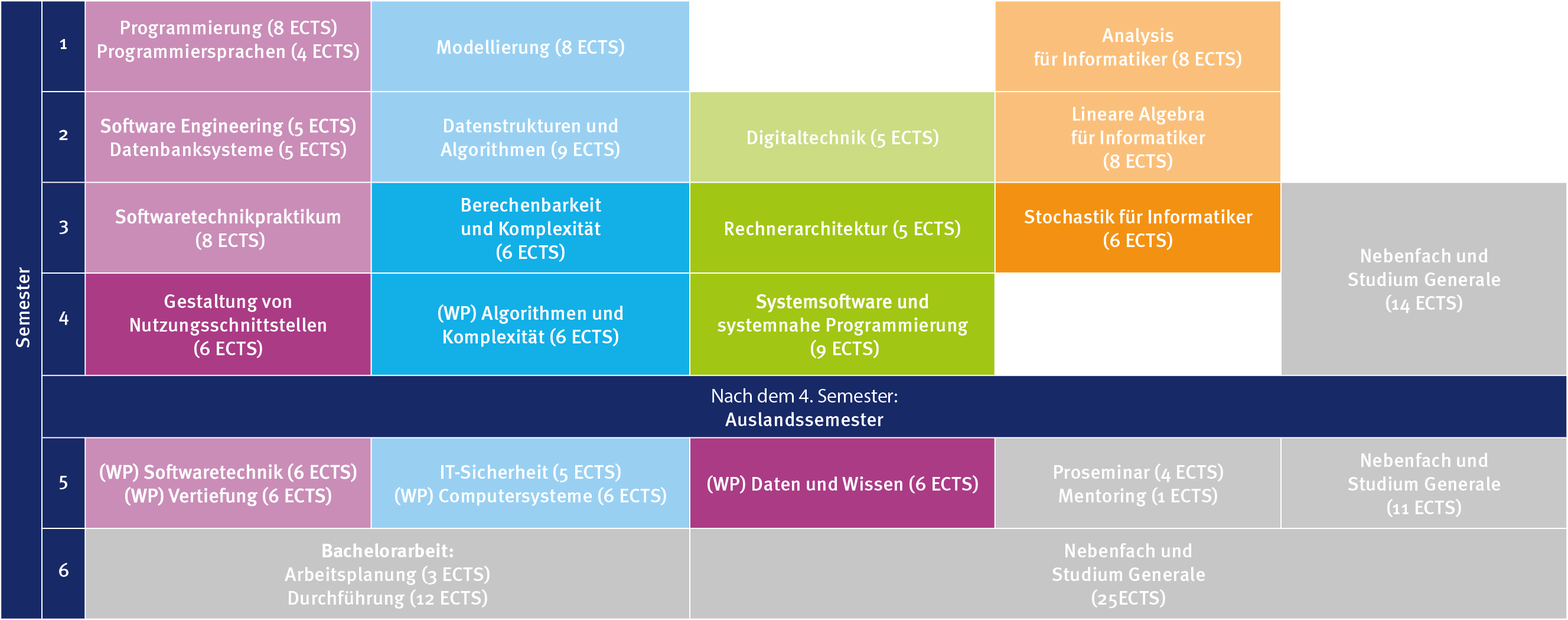Wenn du mit dem Wintersemester 2024/25 anfängst, dann ist dies nicht mehr relevant für dich.
If you started during Winter Term 2024/25 this information ist not relevant for you.
Diese Seite bietet einen guten Überblick über den Studienverlauf des Informatik-Bachelors. Alle Informationen wurden den Ordnungen und studienrelevanten Gesetzen entnommen, wie sie auf der Info-Seite der Uni angegeben sind. Wenn Du also noch mehr Infos brauchst oder verbindlichere Aussagen willst, findest du dort alles was du brauchst.
This page provides a good overview of the course of study for the Bachelor of Computer Science. All information has been taken from the regulations and laws relevant to the study program, as stated on the info page of the university. So if you need more info or want more binding statements, you can find everything you need there.
Der Bachelorstudiengang Informatik besteht größtenteils aus Modulen der folgenden vier Gebiete:
The bachelor’s degree program in computer science consists largely of modules from the following four areas:
- Softwaretechnik / Daten & Wissen
- Algorithmen und Komplexität
- Computersysteme
- Mathematik
- Software Engineering / Data & Knowledge
- Algorithms and complexity
- Computersystems
- Mathematics


Module
Modules
Ein Modul einspricht einem Eintrag in der obigen Tabelle. Es besteht in der Regel aus einer Vorlesung, kann aber auch in späteren Semestern ein Seminar oder eine Abschlussarbeit sein.
A module corresponds to an entry in the table above. It usually consists of a lecture, but can also be a seminar or a thesis in later semesters.
Grundstudium & Hauptstudium
Undergraduate & Graduate
Der Bachelorstudiengang ist in zwei Abschnitte unterteilt.
The bachelor’s degree program is divided into two sections.
Im ersten Studienabschnitt (1. bis 4. Semester), dem sogenannten Grundstudium, habt ihr kaum eine Wahlmöglichkeiten. Hier sollen euch die Grundlagen der Informatik beigebracht werden, bspw. das Programmieren, grundlegende Methoden der theoretischen Informatik, Grundlagen der technischen Informatik oder erste Betriebssystemkonzepte.
In the first part of your studies (1st to 4th semester), the so-called basic studies, you hardly have any options. Here you will be taught the basics of computer science, e.g. programming, basic methods of theoretical computer science, basics of technical computer science or first operating system concepts.
Im zweiten Studienabschnitt (5. bis 6. Semester), dem Hauptstudium, könnt ihr eure Veranstaltungen größtenteils frei wählen. Das ermöglicht nach dem Grundstudium einen Auslandsaufenthalt zu absolvieren. Es kann außerdem eine berufspraktische Phase (typischerweise zwischen dem vierten und fünften Semester) durchgeführt werden. Im Hauptstudium muss nur jeder der vier Bereiche durch mindestens ein Modul abgedeckt werden.
In the second study period (5th to 6th semester), the main study period, you can choose your courses freely for the most part. This enables you to spend time abroad after your basic studies. You can also complete a professional internship phase (typically between the fourth and fifth semesters). In the main studies, only each of the four areas must be covered by at least one module.
Eine Ausnahme von der Trennung zwischen Grund- und Hauptstudium gibt es: Im vierten Semester ist bereits die erste Veranstaltung aus dem Hauptstudium vorgesehen (in der Muster-Tabelle ist es oben eine Veranstaltung aus dem Bereich Algorithmen und Komplexität), sodass ihr bereits im 4. Semester eine Wahlmöglichkeit habt. Die Pflichtveranstaltung IT-Sicherheit (ITS) liegt hingegen im 5. Semester.
There is one exception to the separation between basic and main studies: In the fourth semester, the first course from the main study program is already scheduled (in the sample table above, it is a course from the field of algorithms and complexity), so that you already have a choice in the 4th semester. The compulsory course IT Security (ITS), on the other hand, is in the 5th semester.
Proseminar
Proseminar
Zusätzlich muss ein Proseminar absolviert werden, welches euch das wissenschaftliche Arbeiten näher bringt (u.a. die Quellenrecherche). In diesem erarbeitet ihr zum Beispiel eine schriftliche Ausarbeitung eines Themas. Da das Proseminar auf die Bachelorarbeit vorbereitet, sollte dieses auch wie vorgesehen im fünften Semester absolviert werden.
In addition, a proseminar must be completed, which introduces you to scientific work (including source research). In this seminar you will, for example, work on a written elaboration of a topic. Since the proseminar prepares you for the bachelor thesis, it should also be completed in the fifth semester as planned.
Mentoring
Mentoring
Das Mentoring begleitet euch im gesamten Bachelor. Dort werdet ihr in regelmäßigen Treffen mit eurem Mentor (Professor oder Mitarbeiter) und anderen Studierenden euer Studium planen und etwaige Probleme diskutieren.
Mentoring accompanies you throughout your Bachelor’s degree. There you will have regular meetings with your mentor (professor or staff member) and other students to plan your studies and discuss any problems.
Achtung: Ihr benötigt den ECTS von Mentoring für euren erfolgreichen Abschluss des Bachelor-Studiums. Mehr dazu hier.
Attention: You will need the ECTS from Mentoring for your successful completion of the Bachelor’s program. Read more here.
Sollten während eures Studiums Probleme oder Fragen aufkommen, die ihr nicht beantworten könnt, steht euch die Fachschaft Mathe/Info immer gerne mit Rat und Tat zur Seite und wir haben in der Vergangenheit schon fast alle erdenklichen Herausforderungen versucht zu lösen. Zusätzlich gibt es das bereits angesprochene Mentoring, so dass ihr eure Fragen auch in der Gruppe oder per Mail mit Dozenten besprechen könnt.
If problems or questions arise during your studies that you cannot answer, the math/info student council is always happy to help and advise you, and we have tried to solve almost every conceivable challenge in the past. In addition, there is the already mentioned mentoring, so that you can also discuss your questions in the group or by mail with lecturers.
Studium Generale (SG)
Studium Generale (SG)
Die Idee beim Studium Generale ist es, euch zu ermutigen ein wenig über den Tellerrand hinaus zu schauen. Im Studium Generale könnt ihr euch fast alles anrechnen lassen, was an der Uni angeboten wird. Ihr könnt Sprachen lernen, die „Biblischen Bezüge in den Simpsons“ untersuchen, Astronomie hören oder euren Horizont in „Zombologie: Das Seminar der lebenden Toten“ erweitern. Eigentlich ist für jeden Geschmack etwas dabei!
The idea of Studium Generale is to encourage you to think a little outside the box. In the Studium Generale you can get credit for almost everything that is offered at the university. You can learn languages, study the “Biblical References in The Simpsons”, listen to astronomy or broaden your horizon in “Zombology: The Seminar of the Living Dead”. Actually, there’s something for everyone!
Um eine Veranstaltung für das Studium Generale hören zu dürfen, gibt es nur wenige Voraussetzungen. Es darf (in der Regel) keine Veranstaltung der Informatik sein und der Dozent muss die Teilnahme erlauben. Die Kriterien zum Bestehen sind von Dozent zu Dozent unterschiedlich: Bei einigen reicht die aktive Teilnahme, andere wollen eine kurze Ausarbeitung, ein Referat oder eine Klausur. Welche Bedingungen ihr erfüllen müsst, fragt ihr am besten direkt beim jeweiligen Dozenten. Mindestens eine der Studium GeneraleVeranstaltungen muss benotet sein. Die Note hat jedoch keinen großen Einfluss auf eure Gesamtnote.
To be allowed to listen to a course for the Studium Generale, there are only a few requirements. It must (usually) not be a computer science course and the lecturer must allow participation. The criteria for passing the course vary from lecturer to lecturer: Some require active participation, others a short paper, a presentation or a written exam. The best way to find out which conditions you have to fulfill is to ask the respective lecturer directly. At least one of the Studium Generale courses must be graded. However, the grade has no great influence on your overall grade.
Im Vorlesungsverzeichnis existiert bereits ein ganzer Katalog an Studium Generale Veranstaltungen. Wenn ihr eine Veranstaltung belegen möchtet, die nicht unter „Studium Generale“ aufgeführt wird, wendet ihr euch am einfachsten an den jeweiligen Dozenten. Ab und an gibt es leider Zulassungsgrenzen für Studium Generale-Hörer oder es werden gar keine Studium Generale-Studierenden zugelassen. In der Regel ist eine Teilnahme aber möglich. Kontaktiert dazu die Studienberatung bzw. das Studienbüro des anbietenden Fachs und erkundigt euch, wie das weitere Vorgehen ist. Dies kann mittels Formular oder eine händische Eintragung gehen, hängt aber von den jeweiligen dortigen Prozessen ab.
There is already a whole catalog of Studium Generale courses in the course catalog. If you would like to take a course that is not listed under “Studium Generale”, simply contact the respective lecturer. Sometimes there are unfortunately admission limits for Studium Generale students or no Studium Generale students are admitted at all. As a rule, however, participation is possible. Contact the student advisory service or the study office of the offering subject and find out how to proceed. This can be done by means of a form or a manual entry, but depends on the respective processes there.
In welchem Semester ihr Veranstaltungen für das Studium Generale hört, ist euch überlassen. Wichtig ist nur, dass ihr mit eurem Nebenfach und dem Studium Generale zusammen mindestens 25 ECTS erreicht. Das Studium Generale hat also einen Umfang von bis zu 7 ECTS Punkten. Weitere Informationen zum Studium Generale findet ihr ggf. beim Institut für Informatik oder bei uns.
It is up to you in which semester you attend courses for the Studium Generale. The only important thing is that you achieve at least 25 ECTS with your minor subject and the Studium Generale together. The Studium Generale therefore has a scope of up to 7 ECTS points. For more information about the Studium Generale, please contact the Institute of Computer Science or us.
